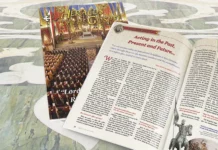God planted another “Eden” within man, in which He would offer him an authentic supernatural friendship, teaching him to love and be loved.

Heralds of the Gospel House in Juiz de Fora (Brazil)
How sublime man’s life must have been in terrestrial Paradise! We can imagine how noble nature was: the plants, the rivers, the animals… What a symphony must have been heard when the birds raised their song heavenward! What perfect flavour the fruit of its trees had! How close was the contact with the Angels!
However, God’s greatest gift to our first parents was undoubtedly His daily conversations with them in the cool of the day (cf. Gn 3:8)! The Lord created man and woman to be with Him, and in this relationship He wished to inundate them with His love. It was in view of this supernatural goal that He placed them in Paradise.
Thus, all those wonders were to be for Adam and Eve the “ladder of love” by which they would ascend to the Beatific Vision, and the Garden of Eden was the “school of charity” where they would learn before all else to love and be loved.
Nevertheless… they sinned! And the Most High, in His infinite merciful justice, expelled them from Paradise and stripped them of a great part of their gifts, of their dominion and of their natural orderliness. But in no way did He deprive them of their love! He acted like a father who, after giving his son a severe reprimand, goes at night to the little one’s bedside to caress him while he sleeps, pouring out the affection that justice impeded him from conveying immediately, so as not to jeopardize his formation.
But while the Creator expelled man from the garden which He had planted in Eden (cf. Gn 3:23), He placed another “Eden” within man himself, in which He would offer him an authentic supernatural friendship and teach him to love and be loved. This interior paradise is called chastity!
Struggle is the school of true love
How does God teach man to love by means of chastity? The explanation is simple, but it must be understood in depth.
Some might ask the following question: “Why does God allow the just to be tormented by the vile attacks of impurity? Why does He let such a fetid mud run over and smear the crystal of a pure soul?
To answer this question, another must be asked: “Was not the entrance of a devil into Paradise also horrible?” And, incredible as it may seem, the answer is: no! For ever since the history of creation took on the configuration of a war (cf. Rev 12:7), good only attains its full beauty when it enters into combat with evil!
The great St. Michael was resplendent with glory in the contemplation of the wonders which God revealed to the Angels before the trial; yet did he not become even more brilliant in defending the honour of the Most High against Lucifer’s arrogance? Is Our Lady in some way lowered by being depicted crushing the head of the serpent? Would St. Joan of Arc shine in the same way if she did not have the merit of having persevered in her faith amidst of a band of traitors?
Would it not have been more in keeping with the unblemished virtue of a King St. Louis to die on a spotless bed in the sacral ambience of a medieval castle, assisted by priests and monks directing his soul to God? So why did Providence allow him to die on the pagan sands of Tunis? Does it not seem appalling that the God-Man – supreme example – should die like a bandit, almost naked, abandoned and outraged? Why, then, was the Redemption wrought in this manner?
All these events occurred as we know them because such was the most beautiful way. Indeed, the fight against evil does not debase the just, but ennobles them! This is why the sword is more magnificent when wielded by a warrior than when locked up in a display case, in the hands of a wax figure. This is also why chastity is more sublime in the clash against the world, the flesh and the devil in the soul of someone who is tried and tempted, than when shining like a trinket on a baby.1
In the soul of the fighter, it is like a furnace that teaches him to offer God a purified and refined love, without pretence or self-interest.2 This is chastity as the “school of love”!
In Paradise, the great “lesson in love” that God gave man was precisely to allow the temptation of the serpent, a test which he did not pass because he did not love. Had he loved, he would also have fought and overcome the vile solicitation of the enemy.
Therefore, there is no love without a willingness to fight!

Feeling loved by God: the reward of pure souls
Furthermore, the interior sanctuary of our chastity teaches us to be loved by God and more worthy of this overflowing love. How?
Certain natural delights please man so much that they seem to touch something in his soul, whereby the bodily and the spiritual are harmoniously united. These pleasures vary between individuals and are too many to enumerate. For some, it may be a piece of music; for others, contact with the sea; for still others, a certain dish or, perhaps, a peaceful rest.
Ultimately, the true contentment derived from such pleasures consists in one feeling loved. In fact, the ungodly man can also enjoy all these pleasures, but he will never reach the conclusion, by means of them, that he is loved by God; for he will enjoy them with selfishness, intemperance and, consequently, with a heavy conscience.
On the contrary, the just man, on account of his temperance and chastity, even when in a trench, cold, hungry and muddied, and in mortal danger – if such be the will of Divine Providence – will be able to calmly reflect: “God has given me the grace to fight! How I am loved by Him!”
No pleasure will lead a person to feel loved by the heavenly Father if he does not love and practise chastity. On the other hand, a chaste person, even while immersed in the greatest trials, will find in his interior paradise the stream from which he will drink the love of God, and for this reason he will forge ahead with head held high (cf. Ps 110:7)!

If we fall, let us rise immediately
In this immense battlefield in which we find ourselves, we must learn never to give ear to the serpent. Sooner or later, he will present himself to us,3 displaying his “power”. He will try, as he did with Eve (cf. Gen 3:1-6), to offer us “knowledge” or convince us to sample what is forbidden… Therefore, let us send this reprobate away! Impurity in no way will make us wiser than chastity, and if we refuse to experience its seductions, we will never regret it, just as we would have no remorse for not having tasted the bitterness of gall.
Now, there is a folly even greater than that of being sullied in the mud of impurity, and that is not wanting to cleanse oneself after being defiled! There is a natural human reflex by which, as soon as something is splashed on our face, we act immediately to remove it; in the same way, whenever someone slips and falls, shame impels him to rise as quickly as possible, minimizing the time spent on the ground. Yet what a dreadful inversion! In the supernatural order, these reflexes often act in the opposite way: when a person sins, that same shame induces him to remain prostrate…
For a child of the Blessed Virgin this cannot be so! If the enemy has succeeded in slackening our will and leading us to do evil, let us immediately make of that will an iron pillar that will crush the serpent and restore us to God’s friendship!

anonymous portrait of St. Louis Gonzaga as a boy
Let us love chastity!
After original sin, God placed Cherubim with flaming swords to guard the entrance to Paradise (cf. Gn 3:24). And let us not think that our chastity, the “interior paradise” of each one of us is any less guarded! We have our good Guardian Angel to defend it; it is enough for us to consign to him the flaming sword of our radicality and piety.
Above all, let us not forget: Our Lady loves us with a special love, and with this same predilection She desires our perseverance and fidelity. In the midst of the struggles that life brings us, and will yet bring us, let us strive to hear her sweet voice that murmurs in our hearts:
“I will contend with those who contend with you and I will fight against those who fight against you! I myself will be your shield and armour, and I will say to you, ‘Here I am, your deliverance.’ Then your soul will rejoice and exult, and enfolded in my arms, will say: ‘How great is the love of my most pure Mother; she desires every good for her servant!’” (cf. Ps 34:1-3, 9-10).
As true heralds of chastity, let us fight courageously! In this way we shall contemplate the triumph of purity and receive the reward of our fidelity in the splendour of the Reign of Mary! ◊
Notes
1 Regarding the struggle that man must undertake to preserve chastity, and how pleasing it is to God, St. Jean-Marie Vianney affirms: “The chastity of a soul is more precious in the eyes of God than that of the Angels, since Christians can only acquire this virtue by fighting, while the Angels possess it by nature; the Angels do not need to fight to preserve it, but the Christian finds himself obliged to wage a constant war against himself. […] The more detached a soul is from itself by resisting its passions, the more it draws nearer to God and, as a blessed reward, the more intimately God unites himself to it: He contemplates it and considers it as His most loving spouse, making it the object of His sweetest delights and establishing in its heart His perpetual abode” (ST. JEAN-BAPTISTE-MARIE VIANNEY. Vida y virtud. Homilías II. Madrid: RIALP, 2011, p.192-193).
2 St. Alphonsus de Liguori rightly reminds us: “God allows temptations to enrich us with merits, as the Angel said to Tobias: ‘And because thou wast acceptable to God, it was necessary that temptation should prove thee’ (Tb 12:13). […] However strong the temptations of the devil may be, […] if we do not want them, they do not stain the soul, but make it purer, stronger and more beloved by God” (ST. ALPHONSUS MARIA LIGUORI. A prática do amor a Jesus Cristo. 7.ed. Aparecida: Santuário, 1996, p.219).
3 In this regard, the Holy Curé of Ars says: “There is no lack of enemies who strive to snatch it [chastity] from us. We could even say that almost everything around us is conspiring to rob us of it. The devil is one of the most fearsome enemies; living in the midst of the hideousness of impure vices, knowing that there is no sin that outrages God so much, and knowing moreover how pleasing the pure soul is to God, he prepares every kind of snare to snatch this virtue away from us” (ST. JEAN-BAPTISTE- MARIE VIANNEY, op. cit., p.202).






